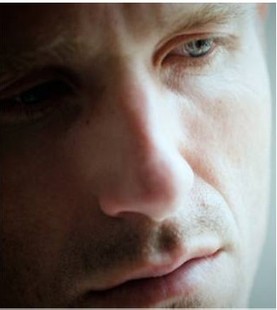M8TZ - SUPERHUMAN REVOLUTION
What is Depression?

Depression is an adaptive mechanism which has served the species well for millions of years. When things are going well in our lives, we feel good. This good feeling is nature’s way of telling us to keep doing what we’re doing. When our lives are not going well, we feel down or depressed. This is nature’s way of telling us to make some changes.
This is very similar to pain. Pain is a signal that tissue is being damaged and that urgent action is needed. For instance, if you touch a hot stove, the pain induces an immediate reaction to pull your hand away. Usually this is accomplished with minimal damage to the skin. Without pain, we would not respond as quickly to these kinds of situations, and we would incur a great deal more tissue damage than is actually the case.
Depression or despondency is not as acute a sensation as pain. It is more generalized and it signals not imminent tissue damage, but problems of a more general nature. In order to feel good, the following seven factors must be present in our lives.
This is very similar to pain. Pain is a signal that tissue is being damaged and that urgent action is needed. For instance, if you touch a hot stove, the pain induces an immediate reaction to pull your hand away. Usually this is accomplished with minimal damage to the skin. Without pain, we would not respond as quickly to these kinds of situations, and we would incur a great deal more tissue damage than is actually the case.
Depression or despondency is not as acute a sensation as pain. It is more generalized and it signals not imminent tissue damage, but problems of a more general nature. In order to feel good, the following seven factors must be present in our lives.
|
|
When any of these factors are missing, or are present to only a slight degree, we begin to feel despondent or depressed. When many of these factors are missing to a large degree, we sink into despair. Over the years, I have worked with hundreds of people who were depressed. To all of these people without exception I could say, “If I were in your shoes, living the life you are living, I would be depressed too.”
Many of these individuals lived on a diet of soda pop, cigarettes, and salami sandwiches. Others drank enormous quantities of alcohol. Few ate vegetables regularly. Many stayed indoors almost all the time. Physical activity was almost always minimal. Purposeful activity i.e. activity directed towards some kind of goal was seldom present, and good honest, open relationships almost non-existent.
Many of these individuals lived on a diet of soda pop, cigarettes, and salami sandwiches. Others drank enormous quantities of alcohol. Few ate vegetables regularly. Many stayed indoors almost all the time. Physical activity was almost always minimal. Purposeful activity i.e. activity directed towards some kind of goal was seldom present, and good honest, open relationships almost non-existent.
|
The point here is not to disparage or castigate people who are depressed, but rather to point out that depression is essentially and fundamentally a function of what we are doing; how we are living our lives. It is not an illness. It is the body’s natural feedback system.
It is nature’s way of trying to induce in us some motivation to make changes in our lifestyle – to eat better; to abstain from toxic substances; to get out in the fresh air and sunshine; to identify goals and pursue them and to talk to friends and family honestly and openly about the things that trouble us. If we do these things consistently and regularly– if we integrate these things into our daily routines, then we will start to feel good. If we don’t do these things, we will feel depressed. Or as Peter Breggin, MD, puts it in Antidepressants Cause Suicide and Violence in Soldiers: “The principles for overcoming depression are exactly the same principles required for living a good and happy life.” |
Everybody experiences an occasional down day. But we also know what to do about it;– get out for a walk; start a project; talk to a friend or loved one, etc. Chronically depressed people, however, are individuals who have been neglecting these areas for years. They spend the vast majority of their lives indoors, watching television and eating snack food. They are often over-weight, have no goals other than the next TV show, and although they may have many acquaintances, they do not share their concerns and worries in an open and honest manner.
Of course, not all depressed people are deficient in all these areas. Some depressed people eat well, but never share their worries or concerns with anybody. Others share their worries, but have no purposeful activities. Others have purposeful and rewarding jobs, but never get outdoors and never engage in physical activity and so on.
To feel consistently good, we need to have all of these factors present in our lives to a substantial and significant degree. Nor is this such a daunting proposition. A person who eats moderately from the five main food groups; who controls his intake of sugar and alcohol; who doesn’t smoke; who has a job or hobby that provides challenges and a sense of fulfillment; who gets outdoors most days for exercise or even for a brisk walk; and who has at least one other person with whom he is open and honest, will feel generally positive.
A person whose life is lacking in one or more of these areas will feel generally negative. This latter is not an illness; it is not an instance of something going wrong in our bodies. Rather it is an instance of something going right. Depression is a message from the organism calling for change. Induction of negative feelings is the only language the organism has to express the need to make changes.
Severe losses can, of course, precipitate depression even in otherwise very orderly and functional lives. Even when all seven factors are present to a substantial degree, the loss of a loved one will usually result in profound feelings of depression. Similarly, the loss of one’s career, health, home, etc., will generate some measure of depression regardless of previous lifestyle.
|
People who have been living functional and productive lifestyles, as described above, however, will normally come to terms with the loss in a reasonable time frame. They will talk about the loss to the people in whom they confide; they will continue to eat well and to exercise, and will continue with the various purposeful activities they have always pursued.
Gradually the sense of loss will recede and the ability to enjoy life will return. When it seems as if life is coming apart at the seams, it is our routines that save us; provided we have established good functional routines which incorporate the seven factors mentioned above. |
However, for people whose lifestyles are deficient, or only marginal, in terms of the seven factors mentioned earlier, a major loss can put them “over the edge,” and they sink into a state of chronic long-term despondency. In this regard it is worth noting that all human lives are, sooner or later, touched by major tragic losses. What matters is: how equipped are we, in habits and lifestyle, to handle these losses.
When a person goes to a mental health center and asks for help with depression, the first priority should be a detailed assessment of the person’s lifestyle, habits, relationships, history, etc., to determine the source of the depressive feelings. From this assessment, a remedial program should be developed and active support and assistance provided to the client in the implementation of this program.
Source: http://behaviorismandmentalhealth.com/2009/07/28/depression/#.T91tnpjRVAo
M8TZ - Superhuman Revolution: Worldwide | New Zealand | Australia | United States | United Kingdom | Canada | China | India
Contact MATES | Sitemap | Policies | | - © M8TZ 2024 All rights reserved.
Contact MATES | Sitemap | Policies | | - © M8TZ 2024 All rights reserved.



